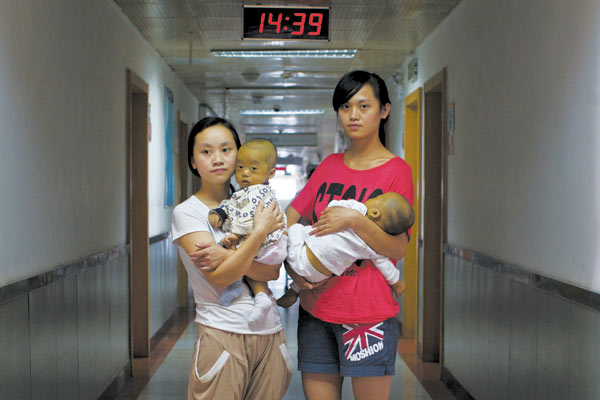Mothers offer gift of hope
Updated: 2012-09-14 02:05
By Wang Qingyun (China Daily)
|
||||||||
 |
|
Yin Chunlin and Luo Dan, two liver donors, hold their children at the General Hospital of Armed Police Forces in Beijing on Monday.ZHOU GANGFENG / FOR CHINA DAILY |
Two young mothers will undergo surgery in China's first paired liver donation.
The mothers will donate part of their livers to each other's children in Beijing on Friday in the General Hospital of Armed Police Forces.
Li Wei, a liver transplant surgeon at the hospital, said it is the first liver transplant in China where donors have exchanged donations.
One of the donors, 23-year-old Luo Dan, gave birth to a son in November. However, the baby was diagnosed with biliary atresia, a kind of liver disease, 40 days after he was born.
In early January, the boy underwent surgery to treat the disease, but his liver worsened rapidly afterward and he needed a liver transplant, Luo said.
The boy's blood type is O. However, Luo's blood type is B, and her husband's is A, which means they are not perfect donors for their son.
"Without any treatment, children with the disease usually die from cirrhosis within two years," Li said. "Theoretically, it is possible to conduct a liver transplant between people with different blood types, but the result is not as good as a transplant within the same blood type," Li said.
Luo began to search for a donor, offering part of her liver in exchange.
"I would rather try to find a way to save my son than sit here waiting for a donor to come," said Luo, who brought her son to the hospital in early May and has been waiting for the operation ever since.
"Two kids who needed the transplant have passed away since we've been waiting in the hospital."
According to Li, there are about 30 children waiting for liver transplant surgeries in the hospital, most without a donor.
"Lack of donors has always been a bottleneck in liver transplants," he said. "Usually it takes three to five months to find a donor."
Finally, Luo found Yin Chunlin in an online chat group for parents whose children have the same problem.
Yin, 22, joined the chat group after giving birth to a son with the same liver disease in January.
Yin's husband was found to have liver problems a year ago and cannot donate.
Though Yin's type O blood allows her to donate her own liver tissue to her son, she agreed to provide it to Luo's baby after talking to Luo online and over the telephone.
"I didn't hesitate to say yes to Luo," said Yin, who brought her baby to the hospital on Aug 26. "By doing this we can save two children."
"Only mothers of such babies can feel what we feel," she said.
The surgeon Li believed Yin has made a reasonable choice.
Yin can donate her liver tissue to her son, but the transplant will be more successful if the donor also has type B blood, he said.
Current regulations stipulate that people can only donate organs to their spouses and relatives, or people who can prove they are treated like family members.
However, there have been organ exchanges between unrelated people.
In 2008, family donors of two uremia patients exchanged donations to match the patients' blood types in a hospital in Hainan province. Responding to the controversy, organ transplant authorities in the Ministry of Health came to the conclusion that what the two families did was legal.
"After all, saving lives comes first. Paired liver donation is common in countries such as South Korea, Japan and the United States," Li said.
Contact the writer at wangqingyun@ chinadaily.com.cn
- Harsher crackdown on illegal organ transplants
- China nabs 137 for organ traffick
- New organ donation system to go national
- China's organ transplant system critical
- China to adopt tougher rules on organ donors
- 3 medics arrested over illegal kidney transplants
- Team head resigns over HIV+ organ transplants
- China to crack down illegal transplants

 Relief reaches isolated village
Relief reaches isolated village
 Rainfall poses new threats to quake-hit region
Rainfall poses new threats to quake-hit region
 Funerals begin for Boston bombing victims
Funerals begin for Boston bombing victims
 Quake takeaway from China's Air Force
Quake takeaway from China's Air Force
 Obama celebrates young inventors at science fair
Obama celebrates young inventors at science fair
 Earth Day marked around the world
Earth Day marked around the world
 Volunteer team helping students find sense of normalcy
Volunteer team helping students find sense of normalcy
 Ethnic groups quick to join rescue efforts
Ethnic groups quick to join rescue efforts
Most Viewed
Editor's Picks

|

|

|

|

|

|
Today's Top News
Health new priority for quake zone
Xi meets US top military officer
Japan's boats driven out of Diaoyu
China mulls online shopping legislation
Bird flu death toll rises to 22
Putin appoints new ambassador to China
Japanese ships blocked from Diaoyu Islands
Inspired by Guan, more Chinese pick up golf
US Weekly

|

|







